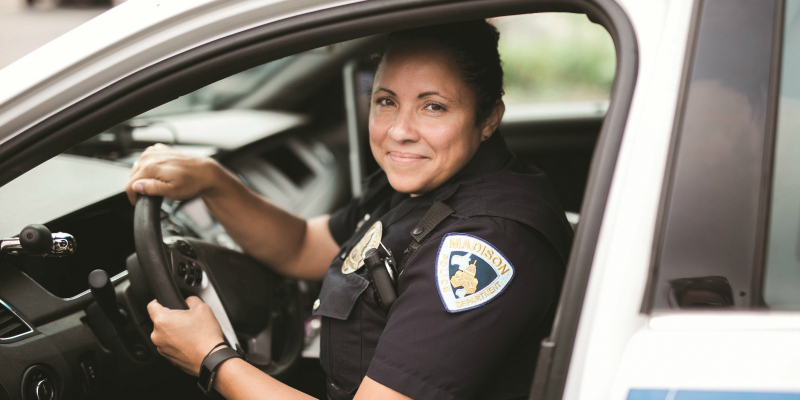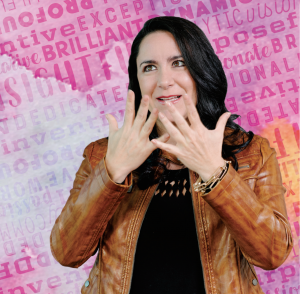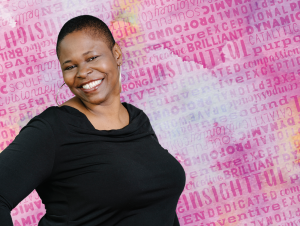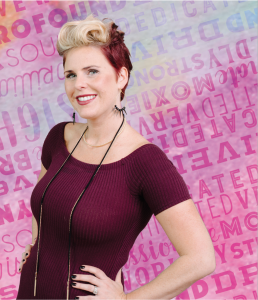By Marni McEntee | Photographed By Jen Dederich
Alex Nieves Reyes was 14 when her mom brought her and her three siblings from Puerto Rico to New York City. Times weren’t easy and the family ended up on the streets, and then in a shelter.
That’s when Nieves Reyes found out what a cop shouldn’t be.
One evening after dark, her mom sent her and her little sister downstairs to buy a pack of cigarettes. When the two girls came out of the store, a group of boys started grabbing their breasts, crotches and buttocks.
Her sister just wanted to run away. “But I said, ‘no, it’s not right.’” So, she called the police. It took ages for an officer to arrive and when he got there all he said was “just stay upstairs.”
Even as a teen, Nieves Reyes was so disappointed.
“Everything that I have been through I think I mentally prepared myself to say, ‘I’m going to help somebody someday. I am going to be better at this.’”
As an adult, she served in the Air Force before moving to Madison in 2000, where she lives with her three kids. She took the steps toward a law enforcement career and eventually landed a job in the Dane County Sheriff’s Department.
“You learn a lot working in the jail. You have to find who you are really quick. It was an experience not only being a woman, but being a foreigner. And, really, I’m not a foreigner, I’m an American.”
“I had a supervisor who really diminished everything I did,” she says. “It was a lot of proving myself. I had a conflict with who I was—this loving person, but still a strong personality—which is what I thought I should be,” Nieves Reyes says. “I get this dream sometimes and I have it repeatedly where I am talking and people aren’t listening, and sometimes that’s how it feels to be a female in a male’s career. But I can’t shut up.”
Eventually, Nieves Reyes left the sheriff’s department and took a post with Madison Police, where she worked for nine years as a patrol officer. She found her fit. “They believed in me from the beginning,” she says of the department, where women make up nearly 30 percent of the force’s sworn officers. Of the department’s 137 female officers, five are Latina, a police spokesman says.
This year, Nieves Reyes started her new post as a neighborhood officer on the North Side, including the Packers Avenue, Kipling and Northport areas. In her new role Nieves Reyes says she’s thriving, because she can use her “female” strengths, like good communication, empathy and warmth, to help build positive connections, especially as police nationwide are distrusted more than ever, given the recent string of police officers shooting black civilians.
Nieves Reyes works to find out what’s behind the high number of police calls in a neighborhood, on a family and community level.
“I have the opportunity to go there and say ‘why are we here so much? What is happening? And then I work with that family and try to resolve it. In my opinion and in my experience, I do it through kids.”
One public way she does the work, says colleague Alison Ahlgrim, is through the East Madison Community Center, where Ahlgrim was assistant director until recently. Proactive about building positive relationships Nieves Reyes first contacted the center after the police shooting of Philando Castile in St. Paul, Minnesota. She’s collaborated with the center on several events, including a picnic and a chili cookoff and now makes regular visits to the neighborhood.
“Having her there regularly is the start of her relationship with the neighborhood,” Ahlgrim says. “I think people see her like a mother-type figure. Kind of like a tough love mother, because she’ll call you out if you’re not doing the right thing. This is part of why people respond to her and I think people also like the fact that she’s Latina and they feel better about her looking like them,” she says.
“I love the job I’m in now and I think because as a woman I bring so much more,” Nieves Reyes says, reflecting on her tough but nurturing presence. “Guys are so testosterone driven,” she says. “The thing is, they are going through something really bad…I can talk about it. I can put aside the job and say ‘honey, talk to me. What’s going on? Do you need a hug?’ I’m not afraid of doing that.”
This article is part of our “Daring to be Different” series from the October 2017 issue. Click to view the articles with Jen Roman and Sandy Thistle.




